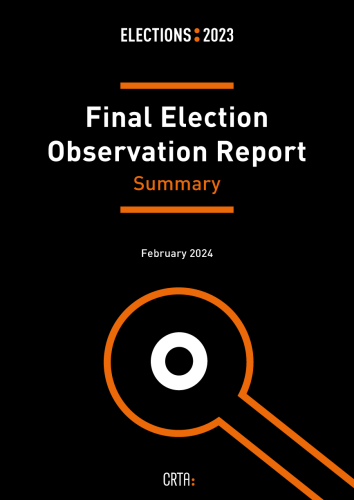Final Election Observation Report – Summary
The extraordinary parliamentary and Belgrade elections were not free and fair.
The election outcomes emerged as a result of the unlawful advantages gained by the ruling party, with the complicity of several state institutions and authorities – primarily the Ministry of Public Administration and Local Self-Government, and the Ministry of Internal Affairs, as well as bodies of certain local self-governments.
From the moment when the elections were officially called, institutions increasingly disregarded legal constraints, leading to local election results in Belgrade not reflecting the freely expressed will of the citizens, and significantly compromising the legitimacy of parliamentary election outcomes.
Responsible institutions are ignoring a mass of evidence and indications of not only gross violations of democratic principles but also a series of criminal acts in the election process. This further reinforced the principles of impunity and legal uncertainty, for which prosecutorial bodies bear the greatest responsibility.
The spectrum of severe endangerments of voters’ and candidates’ rights includes unscrupulous pressures on citizens, manipulations of the voters registry, forgeries of support signatures for nominated lists, misuse of citizens’ personal data, and falsification of the election results publication date in the Official Gazette, committed to prevent the opposition from utilizing the legal deadline for submitting complaints to the Constitutional Court.
Such law violations would not have been possible without the passivity and direct involvement of institutions, i.e. civil servants at various levels of hierarchy. Initiating criminal and disciplinary proceedings to establish responsibility and punish the initiators and perpetrators of the criminal acts destroying the electoral integrity is a prerequisite for any further discussion on the electoral process.
From the observation mission’s standpoint, it is disturbing to note that chronic problems of elections in Serbia have been somewhat overshadowed by the onslaught and weight of evidence about illegal and illegitimate electoral engineering, including organized voter migrations. These include political clientelism and pressures on voters, media inequality, misuse of public resources and office – which were even more pronounced in comparison with previous elections.
The findings of the CRTA Election Observation Mission show serious irregularities at 13 percent of polling stations in the parliamentary elections, while in the Belgrade elections, the share of such polling stations amounts to as much as 21 percent.









